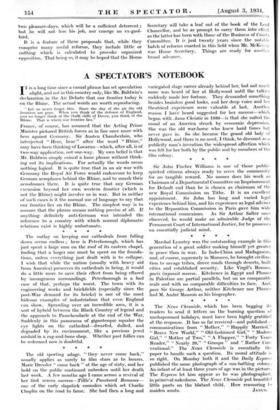A SPECTATOR'S NOTEBOOK I T is a long time since a
casual phrase has set speculation alight, and not in this country only, like Mr. Baldwin's declaration in the Air Debate that our frontier today is on the Rhine. The actual words are worth reproducing.
"Let us never forget this. Since the day of the air the old frontiers are gone. When you think of the defence of England, you no longer think of the chalk cliffs of Dover, you think of the hhine. That is where our frontier lies."
France, of course, has assumed that the Acting Prime Minister pictured British forces as in line once more with hers against Germany. Sir Austen Chamberlain, who interjected "Hear, hear" after the word "Rhine," may have been thinking of Locarno—which, after all, is of two-way application, not one-way. My own belief is that Mr. Baldwin simply coined a loose phrase without think- ing out its implications. For actually the words mean nothing logical. It is quite true that in an air war with Germany the Royal Air Force would endeavour to keep German aeroplanes behind the Rhine, and to smash their aerodromes there. It is quite true that any German excursion beyond her own western frontier (which is not the Rhine) might involve us in war. But in neither of such cases is it the normal use of language to say that our frontier lies on the Rhine. The simplest way is to assume that the phrase means nothing precise at all. If anything definitely anti-German was intended the reference to a country with which normal diplomatic relations exist is highly unfortunate.






























 Previous page
Previous page